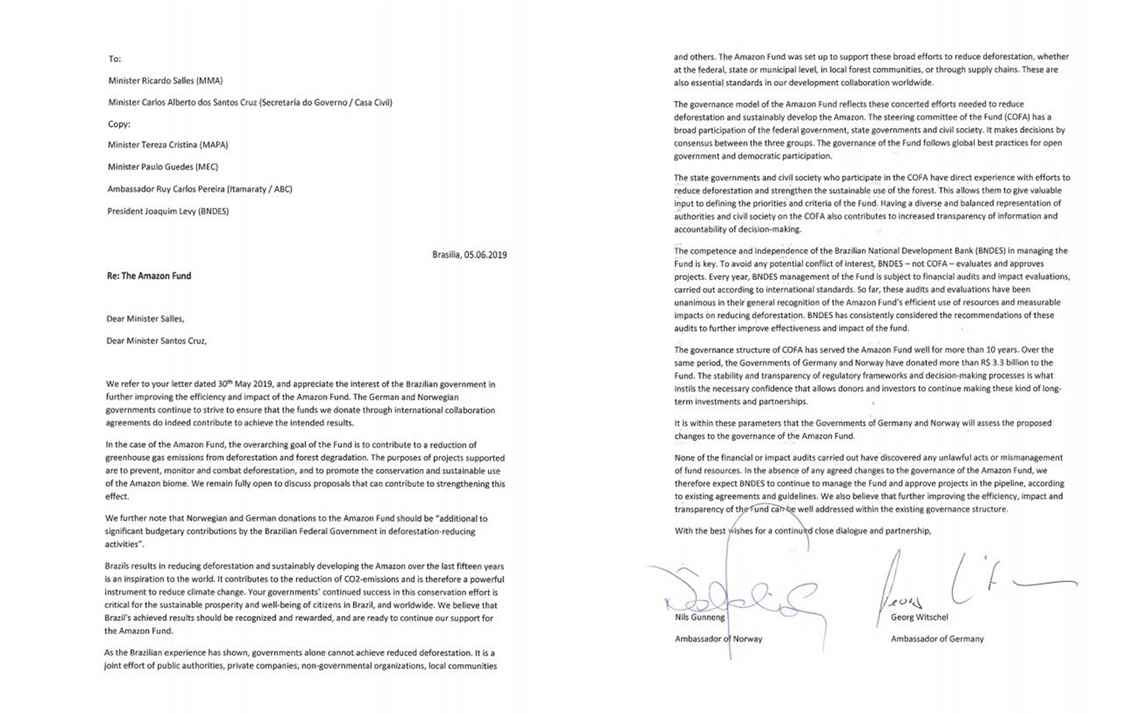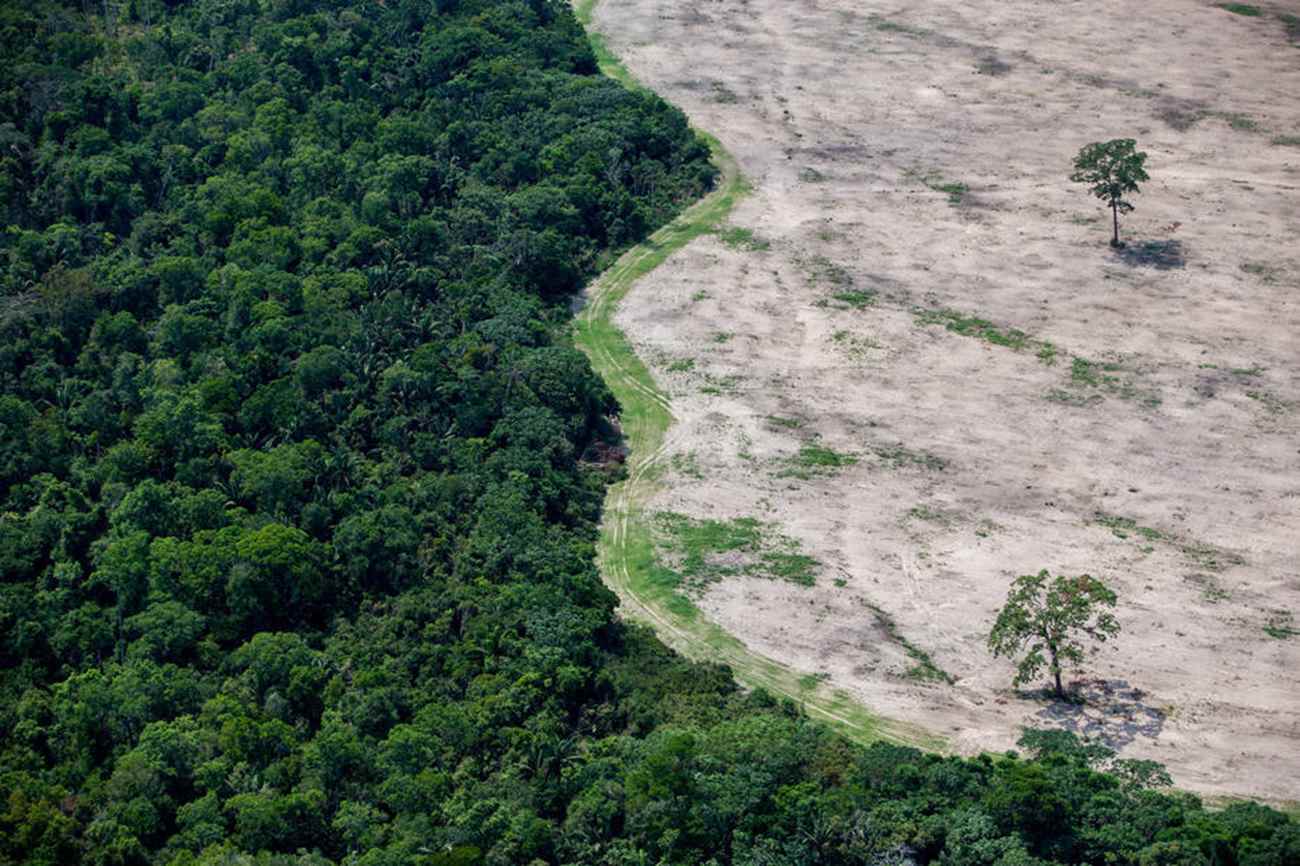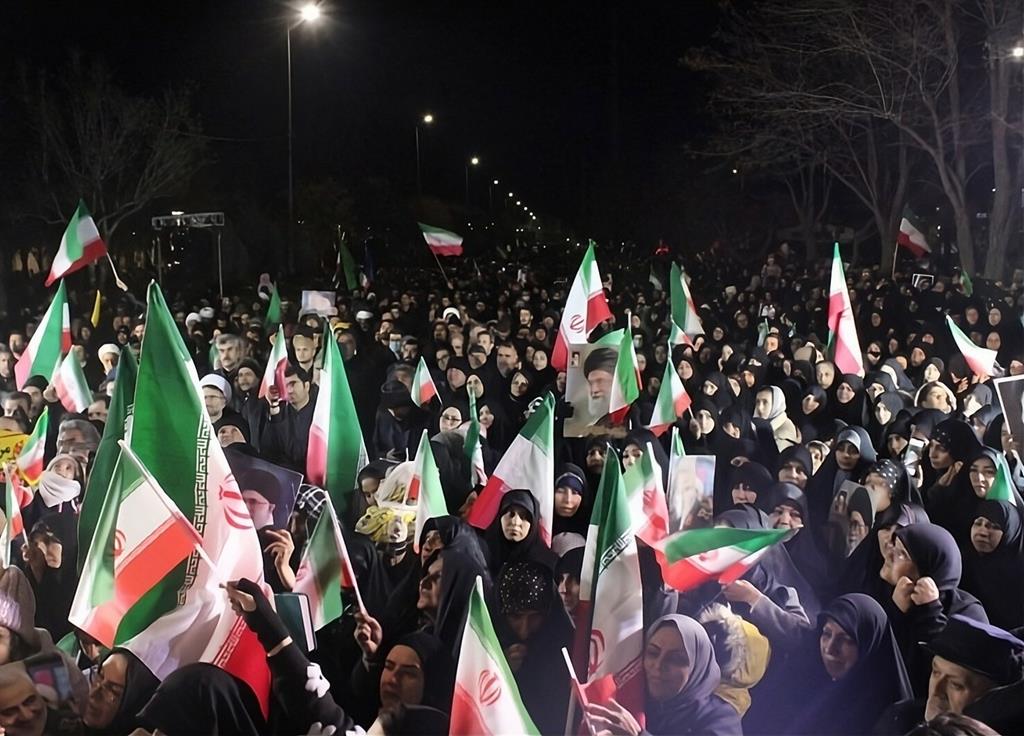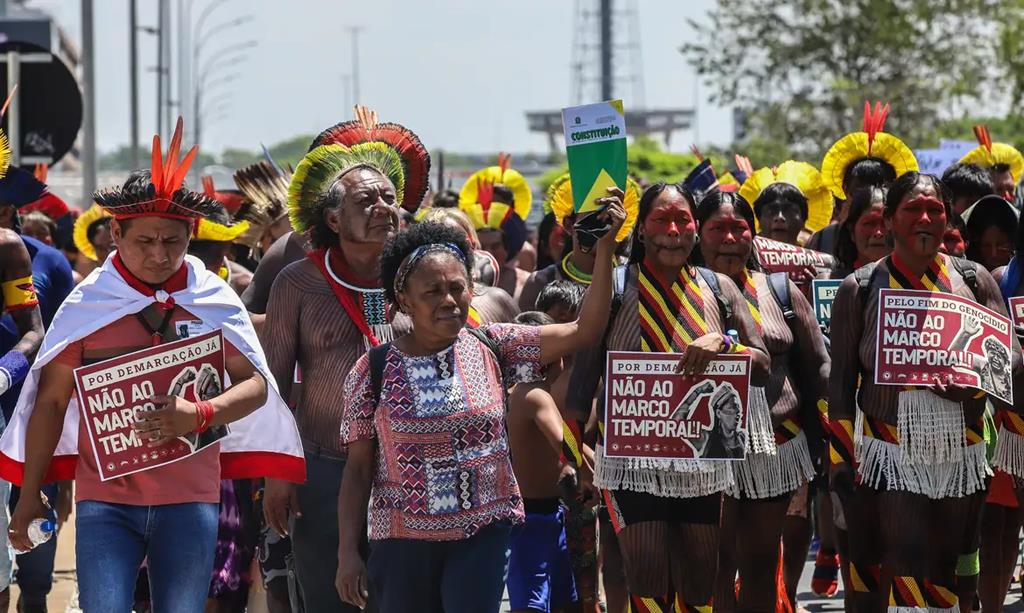Os dois países são responsáveis por 99% das doações do fundo, que financia ações de preservação ambiental. Governo quer mudar a estrutura do comitê organizador e destinar parte dos recursos para indenizar proprietários rurais. Negociações ainda estão em andamento.
Por André Trigueiro, no G1
Os governos da Noruega e da Alemanha se posicionaram contra a proposta do governo federal de alterar o Fundo Amazônia.
Em carta enviada ao ministro do Meio Ambiente, Ricardo Salles, e ao ministro da Secretaria de Governo, o general Santos Cruz, os países defenderam a permanência do Banco Nacional do Desenvolvimento Econômico (BNDES) no Fundo, afirmaram que nunca foram encontrados indícios de irregularidades nas auditorias feitas nos contratos, e disseram que “governos sozinhos não conseguem reduzir o desmatamento”.
A carta foi assinada na quarta-feira passada, dia 5 de junho, Dia Mundial do Meio Ambiente (veja a íntegra abaixo), e foi obtida com exclusividade pelo blog. No mesmo dia, houve um encontro das embaixadas com o ministro Salles para discutir o assunto. As negociações ainda estão em andamento.
O documento das embaixadas é uma resposta a outra carta enviada pelo governo federal no dia 30 de maio, que formalizava a proposta de alteração do fundo, apresentada em uma reunião entre governo e embaixadores. Na época, o ministro do Meio Ambiente, Ricardo Salles, afirmou que o governo só editará um novo decreto para alterar as normas do Fundo Amazônia quando houver um acordo entre “todas as partes”.
Nas entrelinhas do documento, onde os protocolos diplomáticos foram respeitados, a resposta dada pelos embaixadores parece não deixar dúvidas: Noruega e Alemanha, cujas doações somam 99% do fundo, rejeitaram as propostas apresentadas pelo governo para mudar a estrutura do comitê organizador e destinar parte dos recursos para indenizações de proprietários rurais situados em unidades de conservação.
O texto apresenta resultados da redução do desmatamento da Amazônia nos últimos 15 anos para, em seguida, dizer que “a experiência brasileira mostra que governos sozinhos não conseguem reduzir o desmatamento” e que isso se dá devido ao “esforço conjunto entre autoridades públicas, empresas, ONGs e comunidades locais”, uma referência à tentativa de Salles de alterar a composição do Comitê do Fundo Amazônia (Cofa) e aumentar a participação do governo.
As embaixadas defendem a competência e independência do BNDES na gerência do fundo, dizendo que isso elimina qualquer conflito de interesse.
Ao fim do texto, a carta diz que será sobre estes parâmetros que os governos da Alemanha e da Noruega vão avaliar as propostas de mudança no Fundo da Amazônia e dizem esperar que a estrutura se mantenha.
“É dentro desses parâmetros que os governos da Alemanha e da Noruega avaliarão as mudanças propostas para a governança do Fundo Amazônia. Nenhuma das auditorias financeiras ou de impacto realizadas descobriu quaisquer atos ilícitos ou má administração dos recursos do fundo. Na ausência de quaisquer mudanças acordadas na governança do Fundo Amazônia, esperamos, portanto, que o BNDES continue a administrar o Fundo e aprovar projetos em andamento, de acordo com os acordos e diretrizes existentes. Acreditamos também que melhorar ainda mais a eficiência, o impacto e o bem-estar são abordados dentro da estrutura de governança existente”, finalizam.
Questionados, Itamaraty, Planalto, BNDES e Ministério do Meio Ambiente, não se pronunciaram até 11h30.
O Fundo Amazônia foi criado em 2008 para receber doações para a conservação da floresta. Ele é gerido pelo BNDES e tem projetos sobre redução de emissões de gases de efeito estufa provenientes do desmatamento e da degradação florestal. O Fundo Amazônia tem contratos com ONGs e entes governamentais, como estados e municípios.
Em maio, a chefe do departamento responsável pelo Fundo Amazônia no BNDES foi afastada após o ministro Ricardo Salles anunciar que o Ministério do Meio Ambiente havia encontrado indícios de irregularidades e “inconsistências” em contratos que recebem apoio do fundo. No entanto, o ministério não divulgou a proporção exata de contratos de ONGs e de entes governamentais entre o total analisado. Também não foram divulgados os critérios para a seleção dos contratos verificados.
Íntegra do documento, em inglês:

To:
Minister Ricardo Salles (MMA)
Minister Carlos Alberto dos Santos Cruz (Secretaría do Governo / Casa Civil) Copy:
Minister Tereza Cristina (MAPA)
Minister Paulo Guedes (MEC)
Ambassador Ruy Carlos Pereira (Itamaraty / ABC)
President Joaquim Levy (BNDES)
Brasilia, 05.06.2019
Re: The Amazon Fund
Dear Minister Salles,
Dear Minister Santos Cruz,
We refer to your letter dated 30” May 2019, and appreciate the interest of the Brazilian government in further improving the efficiency and impact of the Amazon Fund. The German and Norwegian governments continue to strive to ensure that the funds we donate through international collaboration agreements do indeed contribute to achieve the intended results.
In the case of the Amazon Fund, the overarching goal of the Fund is to contribute to a reduction of greenhouse gas emissions from deforestation and forest degradation. The purposes of projects supported are to prevent, monitor and combat deforestation, and to promote the conservation and sustainable use of the Amazon biome. We remain fully open to discuss proposals that can contribute to strengthening this effect.
We further note that Norwegian and German donations to the Amazon Fund should be “additional to significant budgetary contributions by the Brazilian Federal Government in deforestation-reducing activities”.
Brazils results in reducing deforestation and sustainably developing the Amazon over the last fifteen years is an inspiration to the world. It contributes to the reduction of CO2-emissions and is therefore a powerful instrument to reduce climate change. Your governments” continued success in this conservation effort is critical for the sustainable prosperity and well-being of citizens in.Brazil, and worldwide. We believe that Brazil’s achieved results should be recognized and rewarded, and are ready to continue our support for the Amazon Fund.
As the Brazilian experience has shown, governments alone cannot achieve reduced deforestation. It is a joint effort of public authorities, private companies; non-governmental organizations, local communities and others. The Amazon Fund was set up to support these broad efforts to reduce deforestation, whether at the federal, state or municipal level, in local forest communities, or through supply chains. These are also essentia] standards in our development collaboration worldwide.
The governance model of the Amazon Fund reflects these concerted efforts needed to reduce deforestation and sustainably develop the Amazon. The steering committee of the Fund (COFA) has a broad participation of the federal government, state governments and civil society. It makes decisions by consensus between the three groups. The governance of the Fund follows global best practices for open government and democratic participation.
The state governments and civil society who participate in the COFA have direct experience with efforts to reduce deforestation and strengthen the sustainable use of the forest. This allows them to give valuable input to defining the priorities and criteria of the Fund. Having a diverse and balanced representation of authorities and civil society on the COFA also contributes to increased transparency of information and accountability of decision-makineg.
The competence and independence of the Brazilian National Development Bank (BNDES) in managing the Fund is key. To avoid any potential conflict of interest, BNDES – not COFA — evaluates and approves projects. Every year, BNDES management of the Fund i is subject to financial audits and impact evaluations, carried out according to international standards. So far, these audits and evaluations have been unanimous in their general recognition of the Amazon Fund’s efficient use of resources and measurable impacis ôn reducing deforestation. BNDES has consistently considered the recommendations of these audits to further improve effectiveness and impact of the fund.
The governance structure of COFA has served the Amazon Fund well for more than 10 years. Over the same period, the Governments of Germany and Norway have donated more than R$ 3.3 billion to the Fund. The stability and transparency of regulatory frameworks and decision-making processes is what instils the necessary confidence that allows donors and investors to continue making these kind of long- term investments and partnerships.
It is within these parameters that the Governments of Germany and Norway will assess the proposed changes to the governance of the Amazon Fund.
None of the financial or impact audits carried out have discovered any unlawful acts or mismanagement of fund resources. In the absence of any agreed changes to the governance of the Amazon Fund, we therefore expect BNDES to continue to manage the Fund and approve projects in the pipeline, according to existing agreements and guidelines. We also believe that further improving the efficiency, impact and +he well addressed within the existing governance structure.
With the best dlishes for a continued close dialogue and partnership,
Nils Gunneng , Georg Witschel
Ambassador of Norway Ambassador of Germany
—
Foto: Tiago Queiroz /Estadão




